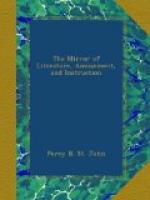and in this easy and commodious style of travelling,
we proceeded. On approaching the settlement, a
fierce dispute arose between the friends; of which,
by each tearing me from the other, I was evidently
the object; and I am quite sure that I should have
been torn to pieces between them, but for the timely
approach of a person who issued from a lofty and handsome
edifice on the road side, attended by a train of preacher-monkeys,
of which he was the chief. He was quite a superior
looking being to either of my first acquaintance, who
cowered and shrunk beneath his eagle look. They
seemed humbly to lay their cases before him; when,
after looking contemptuously on both, he took me to
himself, caressed me, and giving me to an attendant,
said—“This bird belongs to neither,
it is the property of mother church:” and
the property of mother church I remained for some
years. Of my two friends of the palm-tree, one,
the preacher-monkey, turned out to be a poor Irish
lay brother, of the convent of which my new master
(an Irishman too) was the superior. My yellow
parrot was a Scotch adventurer, who came out to give
lectures on
poleetical economy to the Brazilians:
and who, finding that they had no taste for moral science,
had become a servant of all-work to the brotherhood.
My dwelling was a missionary house of the Propaganda,
established for the purpose of converting (i.e. burning)
the poor Indians. The Superior, Father Flynn,
had recently arrived from Lisbon with unlimited powers.
He was clever, eloquent, witty, and humorous; but
panting for a bishopric in his native country, he
was principally employed in theological writings, which
might bring him into notice and hasten his recall to
Europe.
Next to the servant’s hall of a great English
family, the first place in the world for completing
the education of a macaw of genius, is a convent.
Its idleness and ennui render a monkey, or a parrot,
a valuable resource; and between what I picked up,
and what I was taught by the monks of the Propaganda,
my acquirements soon became stupendous. Always
following my kind master from the refectory to the
church, assisting at mess or at mass, being near him
in the seclusion of the oratory, and in the festivities,
he frequently held with his more confidential friends;
I had loaded my astonishing memory with scraps of theology
and of fun. I could sing a French drinking song,
taught me by the sub-prior Frere Jacques, and intonate
a “Gloria in Excelsis” with a true nasal
twang. I had actually learned the Creed in English;[3]
and could call all the brothers by their name.
I had even learned the Savoyard’s dance from
my friend Frere Jacques, and sung “Gai Coco”
at the same time, like Scaliger’s parrot, from
whose history Frere Jacques took the idea of teaching
me. I did this, it must be acknowledged, with
great awkwardness, turning in my toes, and often tumbling
backwards in a clumsy and ludicrous way. But
this amused my religious friends more than all the




